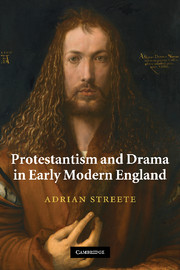Book contents
Afterword
Published online by Cambridge University Press: 11 March 2010
Summary
Towards the end of his career, Thomas Middleton turned increasingly in plays such as Women Beware Women (1621), The Changeling (1622) and A Game at Chess (1624) to address the fraught religious landscape of the final years of James I's reign. The balance that James had managed to maintain between moderate and more militantly minded Protestants in the first two thirds of his reign was, by 1618–20, crumbling. The reasons for this are complex and interrelated. The onset of the Thirty Years War and the disastrous involvement of James' son-in-law Frederick, Elector Palatine constituted one important factor. Militant Protestants saw the political instability in the Hapsburg-controlled lands of central Europe as providing the ideal opportunity to take on the might of Spain. Significantly, those advocating a less bellicose response tended to be of the Arminian faction and they used the uncertainty of these years in order to consolidate their position within the Church. In the aftermath of the defeat of Frederick's Protestants just outside Prague in 1620, English militant Protestants found themselves ideologically and politically on the back foot. The possibility of a Spanish wife for Prince Charles was important in this regard, not least because Charles was known to be receptive to the Arminian theology of clerics like the up-and-coming William Laud. This is where theological differences also played their part.
As I have shown throughout this book, Calvinist strictures on justification by faith, free will and grace were nothing if not controversial.
- Type
- Chapter
- Information
- Protestantism and Drama in Early Modern England , pp. 219 - 222Publisher: Cambridge University PressPrint publication year: 2009
- 1
- Cited by



